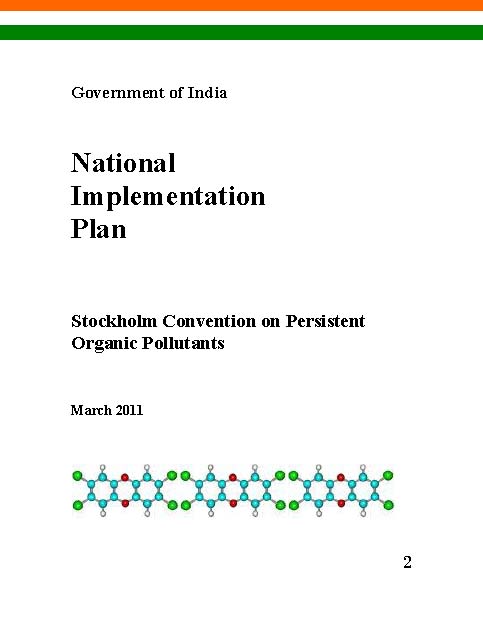/regions/india
India
CPCB announces awards scheme for writing books in Hindi about pollution control and environmental planning and management (2011)
Posted on 15 Apr, 2011 01:24 AMप्रदुषण नियंत्रण और पर्यावरण योजना एवं प्रबंधन से सम्बंधित विषयों पर हिंदी में मौलिक पुस्तक लेखन के लिए पुरस्कार योजना वर्ष - २०११
अधिक जानकारी के लिए, फाइल अटैचमेंट देखे:
Arsenic and chromium hyper-accumulation by an ecotype of Pteris vittata - Possibility of remediation of contaminated water and soil – A paper in Current Science
Posted on 14 Apr, 2011 08:04 PM This study by National Environmental Engineering Research Institute published in Current Science was carried out to identify Pteris vitta and test its hyper-accumulating properties. The plant is commonly known as the Ladder brake fern or Chinese brake fern plant in India, and had been reported elsewhere as an arsenic hyper-accumulator.
This study by National Environmental Engineering Research Institute published in Current Science was carried out to identify Pteris vitta and test its hyper-accumulating properties. The plant is commonly known as the Ladder brake fern or Chinese brake fern plant in India, and had been reported elsewhere as an arsenic hyper-accumulator.
.The remediation of arsenic and chromium contaminated soil and water has become an important environmental issue. It is in this context that the discovery of hyper-accumulator plant species, which have the unusual ability of accumulating metals such as arsenic (As), chromium (Cr), zinc (Zn), nickel (Ni) and copper (Cu) to very high concentrations, has further boosted technologies based on this property.
This is the first report of characterization of arsenic accumulation in an Indian ecotype (plant), which also shows chromium hyperaccumulation in addition to arsenic. Intact plantlets were grown in 20 per cent Hoagland solution amended with up to 200 mg arsenic or chromium medium. Plants absorbed and accumulated a significant amount of arsenic and chromium in their biomass with high bio-enrichment factor. Arsenic and chromium tolerance by spores and gametophytes under in-vitro was also assessed.
Farming practices in different water regimes: Action - Newsletter of AFPRO for April 2011
Posted on 14 Apr, 2011 07:22 PMMoRD announces relaxation in NRDWP guidelines: Sustainability component to be reduced to 10% for 2010-11 and 2011-12
Posted on 14 Apr, 2011 05:54 PMThe MoRD has through this order, announced that this will be relaxed to 10% NRDWP funds, on a 100% Central share basis for all States.
This relaxation would be valid for 2010 – 11 and 2011 – 12. The balance 10% of NRDWP funds that will become available is to be spent on coverage of quality affected and / or non – quality affected habitations, on a 50:50 sharing basis.
Shrishti Eco-Research Institute (SERI) is looking for Environmental Officer & Engineer based at Pune
Posted on 14 Apr, 2011 04:50 PM We have vacancies for the post of Environmental Officer & Engineer at Shrishti Eco-Research Institute (SERI), Pune.
We have vacancies for the post of Environmental Officer & Engineer at Shrishti Eco-Research Institute (SERI), Pune.
The candidate should be dynamic and have confidence, command over English language (both speaking & writing) and willing to travel.
Educational qualification - Post Graduate
Discipline - Science/Engineering
Distributional implications of climate change in India – A policy research working paper by World Bank
Posted on 14 Apr, 2011 03:49 PMThis working paper by World Bank analyzes how changes in the prices of land, labor, and food induced by modest temperature increases over the next three decades will affect household-level welfare in India.
“Reddy” remedies - A look at the Satwant Reddy Committee report on the issue of pesticide residues in packaged drinking water and packaged natural mineral water - Article from Down to Earth magazine
Posted on 14 Apr, 2011 10:28 AMSatwant Reddy committee: Report of the committee on the pesticide residue in packaged drinking water and packaged natural mineral water.
Setting standards
Stockholm Convention on Persistent Organic Pollutants – Draft National Implementation Plan by the Ministry of Environment and Forests (2011)
Posted on 14 Apr, 2011 07:35 AM As per Article 7 of the Stockholm Convention, countries are required to develop the National Implementation Plan (NIP) of the Stockholm Convention on Persistent Organic Pollutants (POPs) to demonstrate how the obligations under the Convention would be implemented. The Convention was adopted with the objective of protecting human health and the environment from POPs and came into force from April 2006 in India.
As per Article 7 of the Stockholm Convention, countries are required to develop the National Implementation Plan (NIP) of the Stockholm Convention on Persistent Organic Pollutants (POPs) to demonstrate how the obligations under the Convention would be implemented. The Convention was adopted with the objective of protecting human health and the environment from POPs and came into force from April 2006 in India.
The Ministry of Environment and Forests, which is the nodal ministry for the Global Environmental Facility (GEF) and Stockholm Convention in India has prepared a NIP and has committed itself to its implementation subject to adequate assistance. It has had to harmonize the interests and stand points of different sectors involved and thereafter determine the position of the Indian government.
India understands that compliance with the obligations on Parties set out in the Convention will have a significant and positive influence not only on India‘s own chemicals management regime but also on the ultimate global success of the Convention. Since among the POPs only Dichloro Diphenyl Trichloroethane (DDT) and Polychlorinated Biphenyls (PCBs) are used in the country the inventory concentrated on DDT storages and facilities where PCB-containing electrical equipment was found.
Evaluation of crop production systems based on locally available biological inputs - A research paper (2006)
Posted on 14 Apr, 2011 01:28 AMHere the yields of crops grown by low-cost inputs including plant biomass are compared with chemical fertiliser-induced production.
The study was conducted over 1999-2004, and the findings conclude that the yields of low intensive biological farming are as good, if not better than chemical fertiliser intensive farming.
Realisation of the fundamental right to water in rural areas: Implications of the evolving policy framework for drinking water – An article by Philippe Cullet in Economic and Political Weekly
Posted on 13 Apr, 2011 10:20 AMThe fundamental right to water in rural areas is well-established in India, but the actual content of this right has not been elaborated upon in judicial decisions. There is no general drinking water legislation that would provide this missing content.